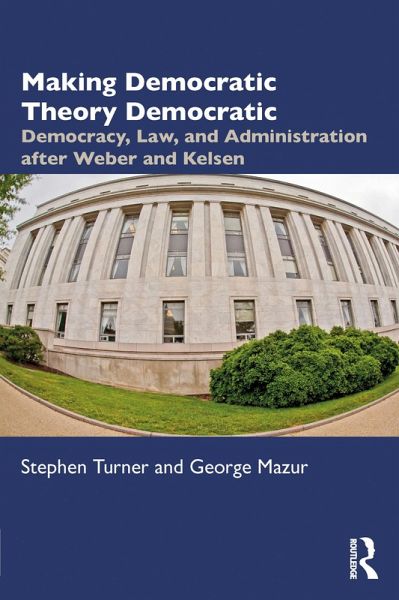
Making Democratic Theory Democratic (eBook, PDF)
Democracy, Law, and Administration after Weber and Kelsen
Versandkostenfrei!
Sofort per Download lieferbar
36,95 €
inkl. MwSt.
Weitere Ausgaben:

PAYBACK Punkte
18 °P sammeln!
This book addressees a timely and fundamental problematic: the gap between the aims that people attempt to realize democratically and the law and administrative practices that actually result.The chapters explain the realities that administration poses for democratic theory. Topics include the political value of accountability, the antinomic character of political values, the relation between ultimate ends and the intermediate ends that are sought by constitutions, and a reconsideration of the meaning of the rule of law itself. The essays are inspired by the demystifying realism of Max Weber a...
This book addressees a timely and fundamental problematic: the gap between the aims that people attempt to realize democratically and the law and administrative practices that actually result.
The chapters explain the realities that administration poses for democratic theory. Topics include the political value of accountability, the antinomic character of political values, the relation between ultimate ends and the intermediate ends that are sought by constitutions, and a reconsideration of the meaning of the rule of law itself. The essays are inspired by the demystifying realism of Max Weber and Hans Kelsen, including explications of their views on law, constitutions, and the rule of law.
The book will be of interest to social and political theorists, philosophers of law, and legal theorists, and for discussions of democratic theory, the administrative state, constitutionalism, and justice, as well as to readers of Weber and Kelsen.
The chapters explain the realities that administration poses for democratic theory. Topics include the political value of accountability, the antinomic character of political values, the relation between ultimate ends and the intermediate ends that are sought by constitutions, and a reconsideration of the meaning of the rule of law itself. The essays are inspired by the demystifying realism of Max Weber and Hans Kelsen, including explications of their views on law, constitutions, and the rule of law.
The book will be of interest to social and political theorists, philosophers of law, and legal theorists, and for discussions of democratic theory, the administrative state, constitutionalism, and justice, as well as to readers of Weber and Kelsen.
Dieser Download kann aus rechtlichen Gründen nur mit Rechnungsadresse in A, B, BG, CY, CZ, D, DK, EW, E, FIN, F, GR, HR, H, IRL, I, LT, L, LR, M, NL, PL, P, R, S, SLO, SK ausgeliefert werden.













